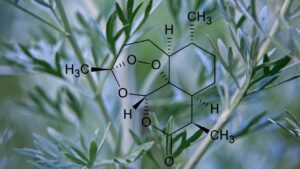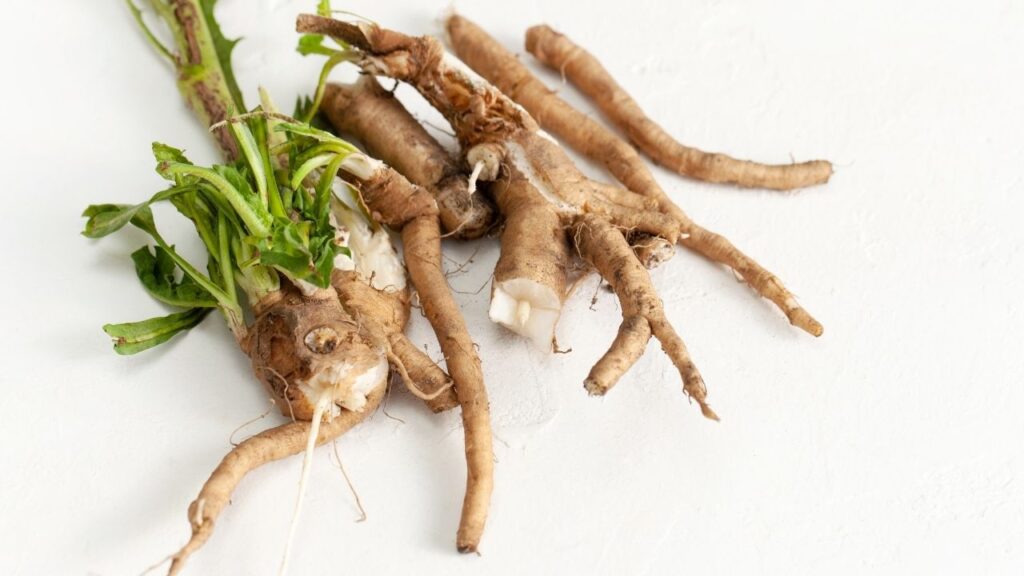Artemisinin has a long history of use in the treatment of malaria, but also shows promise as an anti-cancer agent either on its own or alongside other treatment modalities. Newly developed derivatives may offer increased efficacy and safety profiles.
Key Takeaways
- Dogs can have artemisinin.
- Side effects of artemisinin include fever, poor appetite, vomiting, and anemia.
- Studies have shown artemisinin has anticancer effects.
- Artemisinin can be taken daily.
Artemisinin for Dogs: Its Uses and Anti-Cancer Effects
Artemisinin is extracted from the plant Artemisia annua. Other names include sweet wormwood and, in traditional Chinese medicine, Qinghao or Qinghaosu. Some veterinarians are starting to use artemisinin for dogs with cancer due to some interesting research.
Artemisinin has been used as a fever reducer for over two thousand years and has also been used to treat malaria, particularly in drug-resistant cases.1
Many artemisinin compounds being researched for cancer treatment are synthetic or semi-synthetic derivatives.1,2 These more selective derivatives are often safer and more effective than the original compound.1,3 New research is looking into pairing artemisinin derivatives with other carrier agents or packaging them into nanoparticles to improve their efficacy further and limit side effects.12
Unfortunately, over the years, malaria has begun to develop artemisinin resistance. At this time, it is unclear whether resistance could impact its use in cancer treatment.1,4
Artemisinin’s Evidence for Efficacy
Artemisinin has the potential to affect cancer cells in a variety of ways. However, most include either triggering apoptosis (death) of abnormal cells or helping prevent metastasis (spread) of tumors throughout the body.1
One important way that artemisinin induces apoptosis is by reacting with iron, which is elevated inside neoplastic (cancerous) tissue, to create free radicals that subsequently damage the cells.2 Because the increased iron content is found within the abnormal tissue, artemisinin is able to specifically target these cells while sparing most normal tissue.1
Early canine research shows promising results, including short-term stabilization of disease in tumors that have previously failed treatment4 and increased survival times when used in conjunction with other treatment modalities.5 Studies have documented artemisinin’s ability to target tumor cells while sparing normal tissue.1
One case report in a human with a laryngeal tumor showed a greater than 70% reduction in the size of the mass and a significant improvement in quality of life.6
Artemisinin started out as an anti-malarial drug, but it has some anti-cancer effects as well, especially for the vicious osteosarcoma. Dr. Nancy Reese explains in this episode of Dog Cancer Answers.
Common Uses for Artemisinin
Historically, artemisinin has been used primarily as a treatment for drug-resistant malaria.1 It is under investigation for use in humans in the treatment of breast cancer, prostate cancer, ovarian cancer, colon cancer, kidney and bladder cancers, melanoma, lymphoma, lung cancer, retinoblastoma, and more.1
In dogs, artemisinin has been investigated for use against a variety of cancers, including:4,5,7
A study looking at artemisinin use in dogs with cancer who had failed other treatment options showed a short-term stabilization of disease (i.e., weeks) in approximately a third of the dogs, with one dog having complete resolution of histiocytic sarcoma.4
Another study showed improved survival times for dogs treated with artemisinin alongside other treatment modalities.5
Artemisinin’s Side Effects
Early studies documented significant and severe side effects in animals, including life-threatening neurologic and cardiac toxicities. However, further research has concluded that these negative effects likely resulted from administering high concentrations of artemisinin derivatives through injectable routes.4 Oral use seems much better tolerated.
The most common side effects include:4,7
- Fever
- Decreased appetite
- Vomiting
- Anemia
Some people taking artemisinin derivatives have reported dizziness or vertigo, which resolved when the supplement was discontinued.1 Side effects seem to be more likely when artemisinin is combined with other treatments,1 so it is important always to discuss all of the medications and supplements that your dog is taking with your vet before starting artemisinin.
What Can Artemisinin Be Used Alongside?
Artemisinin is under investigation for use alongside other treatment modalities, including chemotherapy and radiation.1,8 The compound shows the potential to help sensitize tumors to radiation9,10 and chemotherapy agents, and to have a synergistic (additive) effect with other drugs.1,8 This means that it may help make other treatments work better.
Additionally, some studies are looking at using iron with artemisinin to increase its effectiveness.5 However, limited data on using artemisinin with other treatments is currently available. Discuss artemisinin with your veterinarian to determine if this supplement is appropriate for your pet.

Artemisinin supplements are derived from a plant.
When to Not Use Artemisinin with Your Dog
Limited data exist on adverse interactions with other treatment modalities and supplements, so it’s important to discuss artemisinin with your veterinarian to determine if this supplement is appropriate for your pet.
How to Give Artemisinin
Artemisinin is commercially available in powder and capsule form. There is some evidence that using whole-dried-leaf Artemisia may result in improved bioavailability (absorption) over more purified forms.11,13
It is generally recommended to give artemisinin daily with food. The interaction between food and artemisinin is currently being investigated,11,13 and the influence of food on the absorption of artemisinin is unclear at this time.
What If I Miss a Dose?
If you miss a dose, restart the supplement at the next scheduled dose.
Storage and Handling
For storage and handling directions, refer to the manufacturer’s instructions on your product.
Why Aren’t More Veterinarians Using Artemisinin? Bioavailability.
Artemisinin is a promising drug. So why don’t veterinarians heavily embrace it?
One barrier to artemisinin use in veterinary medicine may be the compound’s poor bioavailability. Research has suggested that dogs may not absorb artemisinin well through their gastrointestinal tract.7
When something doesn’t absorb well, increased doses may be needed to get a reasonable dose into the bloodstream. But giving very large doses isn’t always feasible, especially to dogs who object to being pilled or eating large amounts of herbs.
Further investigation is needed into more recently developed derivatives to determine if these may be more effective in dogs.
Do a quick online search and you will see dozens of supplements supposed to be good for dogs with cancer. But are they? Dr. Dressler, author of The Dog Cancer Survival Guide, discusses the supplements worth considering and how they work in this episode of Dog Cancer Answers.
Our Take on Artemisinin for Dogs
Artemisinin has long been used to treat drug-resistant malaria. It shows promise as a cancer treatment, mainly through its ability to specifically target abnormal tissue and induce the death of cancer cells. Recently developed derivatives may increase the compound’s effectiveness while decreasing side effects.
Early research in dogs suggests that artemisinin may help stabilize tumors that have failed to respond to other treatments and increase survival times when used alongside other treatment modalities. When taken orally, artemisinin is relatively well tolerated in dogs, with the most common side effects being decreased appetite, vomiting, and fever.
Unfortunately, study results suggest that dogs may not absorb artemisinin well, and this may limit the compound’s use in veterinary medicine.
Despite the uncertainty surrounding bioavailability, artemisinin, and its derivatives, are being used by some veterinarians. It’s probably worth discussing with your veterinarian, given their ability to specifically target cancerous tissue, application to various tumor types, and minimal side effects when given orally.
- Konstat-Korzenny E, Ascencio-Aragón JA, Niezen-Lugo S, Vázquez-López R. Artemisinin and its synthetic derivatives as a possible therapy for cancer. Med Sci (Basel). 2018;6(1):19. Published 2018 Feb 27. doi:10.3390/medsci6010019
- Lai HC, Singh NP, Sasaki T. Development of artemisinin compounds for cancer treatment. Invest New Drugs. 2013;31(1):230-246. doi:10.1007/s10637-012-9873-z
- Ma Z, Woon CY, Liu CG, et al. Repurposing artemisinin and its derivatives as anticancer drugs: A chance or challenge?. Front Pharmacol. 2021;12:828856. Published 2021 Dec 31. doi:10.3389/fphar.2021.828856
- Rutteman GR, Erich SA, Mol JA, et al. Safety and efficacy field study of artesunate for dogs with non-resectable tumours. Anticancer Res. 2013;33(5):1819-1827.
- Saeed MEM, Breuer E, Hegazy MF, Efferth T. Retrospective study of small pet tumors treated with Artemisia annua and iron. Int J Oncol. 2020;56(1):123-138. doi:10.3892/ijo.2019.4921
- Singh NP, Verma KB. Case report of a laryngeal squamous cell carcinoma treated with artesunate. Arch Oncol. 2002;10(4). doi:10.2298/AOO0204279S
- Hosoya K, Couto CG, London CA, Kisseberth WC, Phelps MA, Dalton JT. Comparison of high-dose intermittent and low-dose continuous oral artemisinin in dogs with naturally occurring tumors. J Am Anim Hosp Assoc. 2014;50(6):390-395. doi:10.5326/JAAHA-MS-6145
- Efferth T. Cancer combination therapies with artemisinin-type drugs. Biochem Pharmacol. 2017;139:56-70. doi:10.1016/j.bcp.2017.03.019
- Luo J, Zhu W, Tang Y, et al. Artemisinin derivative artesunate induces radiosensitivity in cervical cancer cells in vitro and in vivo. Radiat Oncol. 2014;9:84. Published 2014 Mar 25. doi:10.1186/1748-717X-9-84
- Han Z, Onishko H, Hallahan DE. Radiation sensitizing effect of Artemisinin, and old anti-Malarial drug. Int J Radiat Oncol Biol Phys. 2006;66:3. doi:10.1016/j.ijrobp.2006.07.1031
- Weathers PJ, Jordan NJ, Lasin P, Towler MJ. Simulated digestion of dried leaves of Artemisia annua consumed as a treatment (pACT) for malaria. J Ethnopharmacol. 2014;151(2):858-863. doi:10.1016/j.jep.2013.11.043
- Zhou X, Suo F, Haslinger K, Quax WJ. Artemisinin-Type Drugs in Tumor Cell Death: Mechanisms, Combination Treatment with Biologics and Nanoparticle Delivery. Pharmaceutics. 2022;14(2):395. Published 2022 Feb 10. doi:10.3390/pharmaceutics14020395
- Desrosiers MR, Weathers PJ. Effect of leaf digestion and artemisinin solubility for use in oral consumption of dried Artemisia annua leaves to treat malaria. J Ethnopharmacol. 2016;190:313-318. doi:10.1016/j.jep.2016.06.041
Topics
Did You Find This Helpful? Share It with Your Pack!
Use the buttons to share what you learned on social media, download a PDF, print this out, or email it to your veterinarian.









